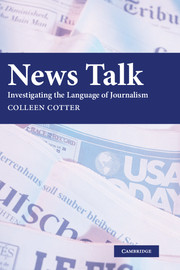Book contents
- Frontmatter
- Contents
- List of figures and tables
- Acknowledgements
- Introduction
- Part I The process and practice of everyday journalism
- Part II Conceptualizing the news
- Part III Constructing the story: texts and contexts
- 7 Story design and the dictates of the “lead”
- 8 “Boilerplate”: Simplifying stories, anchoring text, altering meaning
- 9 Style and standardization in news language
- Part IV Decoding the discourse
- Conclusion and key points
- Epilogue
- Appendices
- Glossary of news and linguistic terms
- References
- Index
8 - “Boilerplate”: Simplifying stories, anchoring text, altering meaning
Published online by Cambridge University Press: 05 June 2012
- Frontmatter
- Contents
- List of figures and tables
- Acknowledgements
- Introduction
- Part I The process and practice of everyday journalism
- Part II Conceptualizing the news
- Part III Constructing the story: texts and contexts
- 7 Story design and the dictates of the “lead”
- 8 “Boilerplate”: Simplifying stories, anchoring text, altering meaning
- 9 Style and standardization in news language
- Part IV Decoding the discourse
- Conclusion and key points
- Epilogue
- Appendices
- Glossary of news and linguistic terms
- References
- Index
Summary
KEY POINTS
Boilerplate is recurring material inserted into stories extending longer than a single day to remind readers of prior context. It is a special type of “background” information.
Boilerplate follows constraints on content and placement within a news text. Its discourse purpose is orientational, orienting the public to the status of a story to date.
Key injunctions of newswriting are manifested in this seemingly throwaway material (often recycled wholesale from previous stories): to simplify, to maintain an authorial distance, and to summarize previously reported details of a story when reporting it afresh.
Boilerplate is repetitious, unattributed, identifies and describes, summarizes, and is potentially expendable as text. Nonetheless, despite its “shorthand” language and a text design resulting from the pragmatic requirements of well-formed news discourse, its role in framing a news story may also end up influencing public debate.
A good news story is more than just scandal, victory, upset, or a tale of woe or triumph. A good news story is also marked by how artfully it is compiled, by the extent to which the reporter manages the injunctions and conventions of newswriting. Well-formed news discourse – the kind found in stories that would be considered well-reported and well-written by news practitioners themselves – is structured by a fairly strict set of rules that the reporter follows and acts on (as was articulated in Chapter 7).
Information
- Type
- Chapter
- Information
- News TalkInvestigating the Language of Journalism, pp. 171 - 186Publisher: Cambridge University PressPrint publication year: 2010
